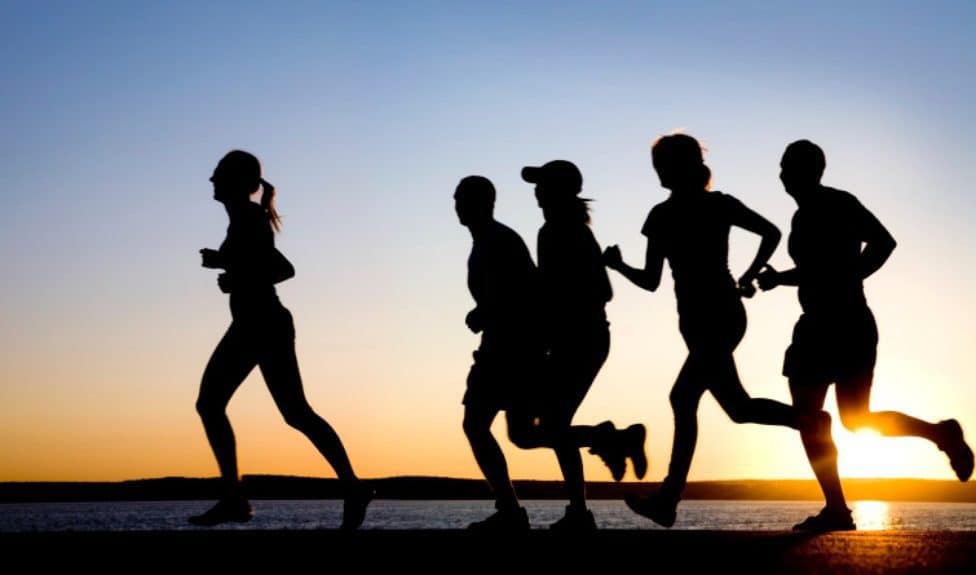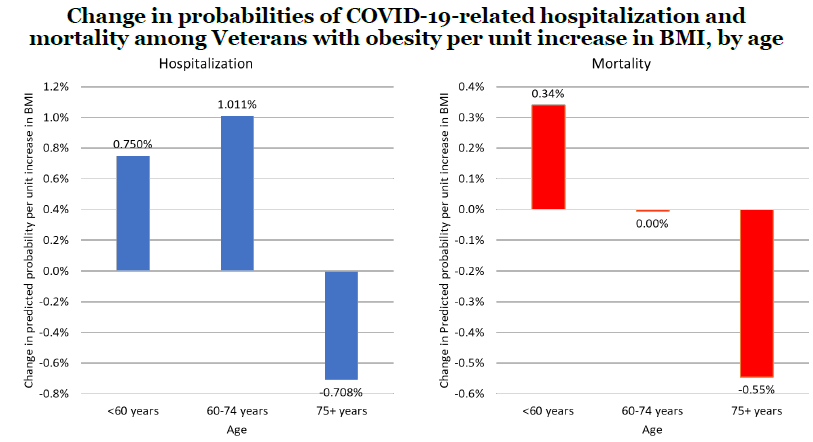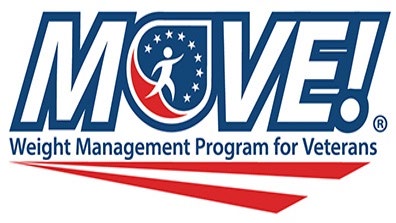Risks of Severe COVID-19 with Increased BMI
Risks of Severe COVID-19 with Increased BMILauren Korshak, DHealth(c), MS, RCEP, Office of Health Equity, Michelle Wong, PhD, Greater Los Angeles VA Medical Center, Sophia Hurley, MSPT, National Center for Health Promotion and Disease Prevention, Jessica Yelena Breland, PhD, MS, VA Palo Alto Health Care System, Michael Goldstein, MD, National Center for Health Promotion and Disease Prevention |
 |
Download PDF
INTRODUCTION
The Veterans Health Administration (VHA) serves a Veteran population that is diverse. Equitable access to high-quality care for all Veterans is a major tenet of the VA health care mission. The Office of Health Equity (OHE) champions the elimination of health disparities and achieving health equity for all Veterans.
HEALTH DISPARITIES
People with obesity are at a higher risk for having severe coronavirus disease 2019 (COVID-19). While older age is a strong risk factor for severe COVID-19, elderly individuals are less likely to be obese than younger individuals. VA researchers at the Palo Alto and Greater Los Angeles VA Medical Centers explored how obesity impacts the risk of developing severe COVID-19 in Veterans.
Body mass index (BMI) is a ratio of an individual’s height and weight and is often used to determine someone’s weight status. In a sample of 9,347 Veterans who received care through the VHA in 2019, approximately one-third who tested positive for COVID-19 were hospitalized. Veterans who were hospitalized with COVID-19 also frequently had high blood pressure, diabetes, and heart disease.

The researchers found that the relationship between BMI and serious COVID-19 was different in Veterans with and without obesity. For Veterans with obesity, the higher an individual’s BMI, the higher the risk for COVID-19–related hospitalization and mortality. Specifically, in Veterans younger than 75, the odds of COVID-19–related hospitalization, ICU admission, and mortality increased as BMI increased between 30 and 39, the ranges of BMI that are considered having obesity.
REDUCING DISPARITIES: NATIONAL CENTER FOR HEALTH PROMOTION AND DISEASE PREVENTION RESOURCES
The Office of Health Equity supports efforts across VA working to reduce health disparities by targeting interventions aimed at Veteran groups at higher risk for poor health outcomes.
THE MOVE! PROGRAM
In 2018 more than three quarters of Veterans receiving care in VHA facilities were considered to be overweight or obese. MOVE! is VA's national weight management program developed for Veterans by the National Center for Health Promotion and Disease Prevention (NCP). MOVE! is an evidence-based self-management program that focuses on health and wellness through healthy eating, physical activity, and behavior change.
MOVE! is effective. 30% of Veterans who actively participate in MOVE! lose about 5% of their initial body weight. This amount of weight loss is associated with decreased risk for chronic disease and improvement in health.
If Veterans are interested in enrolling in MOVE! they can speak to their VA health care team about a referral.

OTHER HEALTHY LIVING TIPS
COVID-19 can be stressful. The National Center for Health Promotion and Disease Prevention has other resources that can help Veterans continue to engage in healthy behaviors while also living through the COVID-19 pandemic. These tips include finding ways to manage stress, communicating regularly with health care providers, finding ways to fit in physical activity, and making healthy food choices.
More information on these tips can be found here: Healthy Living During Stressful Times - National Center for Health Promotion and Disease Prevention (va.gov).
COVID-19 VACCINE INFORMATION
If Veterans and other eligible individuals are interested in receiving a COVID-19 vaccine, they should contact their VA health care provider or go to: https://www.va.gov/health-care/covid-19-vaccine/stay-informed/
For more information about the Office of Health Equity visit: https://www.va.gov/healthequity.
REFERENCES:
Breland, J., Wong, M., et al. 2021. “BMI and Risk of Severe COVID-19 Among Veterans Health Administration Patients.” Obesity. 5 January 2021.
Maciejewski, M., et al. 2018. “Systematic Review of Behavioral Weight Management Program MOVE! for Veterans.” American Journal of Preventative Medicine, 54(5): 704-714.



















